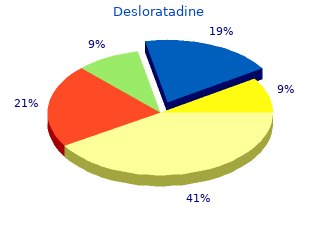Desloratadine
2019, Campbellsville University, Bozep's review: "Desloratadine 5 mg. Buy cheap Desloratadine.".
This may be accomplished through finding a formal support group desloratadine 5mg visa, or getting counseling from a mental health professional discount desloratadine 5 mg line, clergyman, or both. On the HealthyPlace TV show, we will talk about surviving the suicide of a child. I believe that it will be a very emotionally important show and a show that will provide strength to those going through the bereavement process, as well as those who care as about and for those parents. Tell your therapist, a friend, a family member, or someone else who can help. If you are thinking of taking an overdose, give your medicines to someone who can give them to you one day at a time. Remove any dangerous objects or weapons from your home. Set realistic goals for yourself and work at them slowly, one step at a time. Make a written schedule for yourself every day and stick to it no matter what. Set priorities for the things that need to be done first. Cross things out on your schedule as you finish them. A written schedule gives you a sense of predictability and control. Crossing out tasks as you complete them gives a feeling of accomplishment. Get as much sleep as you need, and go out for one or two 30-minute walks each day. Make sure you spend at least 30-minutes a day in the sun. Bright light is good for everyone with depression, not just people with Seasonal Affective Disorder (SAD). You may not feel very social but make yourself talk to other people. Whether you talk about your feelings or about any other topic, reducing your social isolation is likely to be helpful. Remember that while it may feel as if it will never end, depression is not a permanent condition. Taking a suicidal person seriously is the first step to help prevent suicide. If someone threatens or makes statements referring to suicide, take them seriously. Many people have taken their lives when people thought their statements about suicide were "manipulative" or the person was being "melodramatic". They may take some medication, for example, just to get others to hear them and feel they will be discovered and saved. Instead of calling attention to their needs, they in fact, died. If the person is telling you either in person or over the phone that they are going to kill themselves, you call 911 right now. Even if you feel in your heart, that they will not take their life, you go by what they are telling you. If the suicidal person forbids you to call, is angry about it or upset, you call anyway. If the person is calling from an unknown location and discusses suicide, try to find out where they are. You cannot send someone to them if you do not know where to find them. What if that person has you in confidence and makes you swear that you will not tell anyone how they are feeling? A person in crisis may not be aware that they are in need of help or be able to seek it on their own. They may also need to be reminded that effective treatment for depression is available, and that many people can very quickly begin to experience relief from depressive symptoms. Ask these questions first:Availability - do they have the means to carry it out? Illness - do they have a mental or physical illness? What if the person does not "qualify" for the above statements? Yes, always take people seriously when suicide is discussed.


You wanted them to be understanding and accepting generic 5mg desloratadine fast delivery, but they also may need you to be willing to talk more about the self-injury than you had originally intended discount desloratadine 5mg line. Be prepared to answer their questions, even if the questions seem harsh and judgmental. They may ask if you want therapy, what they can do to help you, or why you self injure to begin with. Thinking about these questions, coming up with your own, and answering them before you sit down to talk can help get all your bases covered. If they are curious about the ways you self injure, try telling them in simple statements. For example, "I make cuts on my arms and legs," "I hit things with my fists," or "I burn myself. Disclose, but make sure to keep your wits about you. Unfortunately, people who self-harm not only have psychological scars from their behavior but physical ones too, and explaining self-harm scars to others can seem almost like an impossible task. People with self-harm scars (also known as self-injury scars or self-mutilation scars) may be embarrassed and not want to talk about what was undoubtedly a painful point in their lives. Acts of self-harm, and to some extent the scars from self-harm, tend to keep people at a distance. Self-injury is something done in private and often with shame and guilt attached to the activity. These feelings may then also be associated with the self-injury scars. This tends to bring about loneliness and isolation and may make a person believe that they are alone in their self-harm. Many people, of all ages, self-harm (yes, even adults self-harm ) ??? the act is far more common than most people believe. The details about what you physically did matter a lot less than the feelings that drove you to that place and people may be able to identify with your emotions more readily than your acts. When you tell someone what you need, you are much more likely to get it. Communicate in a way in which you feel comfortable ??? while it might always be ideal to have a face-to-face communication about self-mutilation scars, that might not be something you are comfortable with, so pick a method that makes sense for you. You might start the conversation in an email or letter, although you will still likely have to follow-up face-to-face. Provide a book on self-harm or give them the Self-Injury website address where they can learn more, including self-harm statistics and facts. Self-injury disclosure can come as a complete shock if you are on the receiving end. Your reactions to self-injury disclosure, though, are important. If you know someone who self injures, the first thing you need to do is be aware of self injury and what self-harm actually is. From personal experience, I know that many people find the idea of self injury incredulous, and many people tend to back away from self injurers out of fear. This fear often stems from a limited knowledge of self injury as a whole. If someone confesses their self injurious behavior to you...... However, self injury cutting, and other forms of self-harm, can be a cry for help due to intense and unbearable emotions (see Causes of Self-Injury ). If someone confesses their self injury to you, horror is the last thing you need to express. I realize that this can be difficult, as shock is bound to be an element of your natural reaction. Most self injurers are incredibly clever at concealing their actions from people, and so a confession of this sort can be a very big surprise! What you must realize is that to confess to something such as self injury is a very big step for someone. On a personal note, self-harm is a very difficult topic to cover as I have witnessed many different reactions to my own self injury disclosures; some of which have been extremely beneficial and have worked wonders for me, and some of which have effectively made the problems a little harder to handle. Therefore, in writing this article, I appealed to other self injurers as well as people who had friends/relatives who harmed themselves. But not everyone reacts that way - that was mainly my doctors, and family.

Want to cope with this pernicious safe 5 mg desloratadine, baffling condition? Are You a Narcissist or a Psychopath - or suspect that You are one buy desloratadine 5mg with visa... Click to buy the Narcissism and Abuse Series of SIXTEEN e-Books (more than 5,500 pages) for less than the price of the print edition! He set about to know everything there is about the psychopathic narcissist. He knows everything there is to know about narcissistic and psychopathic abusers and how to cope with them effectively. Anthony Benis, Mount Sinai Hospital, New York, and author "Towards Self and Sanity - On the Genetic Origins of the Human Character")"Sam Vaknin is a leading authority on the topic of narcissism. The author has done probably more than anyone else to educate others to this poorly understood condition. In this, his twelfth book, he shares his considerable knowledgeand experience of narcissism in a comprehensive yet easy to read style. Sam has plugged all the loopholes, exposed all the plots, and introduced a new language to confront the Narcissist. If you want to breathe again, if you are at your wits end, if everything has been tried and failed, if you NEED a change, then Malignant Self Love can give you your life back. The result: Our members go zooming up the learning curve of understanding the Narcissistic Personality Disorder. The ICD-10, the International Classification of Diseases, published by the World Health Organisation in Geneva [1992] regards the Narcissistic Personality Disorder (NPD) as "a personality disorder that fits none of the specific rubrics". It relegates it to the category "Other Specific Personality Disorders" together with the eccentric, "haltlose", immature, passive-aggressive, and psychoneurotic personality disorders and types. The American Psychiatric Association, based in Washington D. The DSM-IV-TR defines Narcissistic Personality Disorder (NPD) as "an all-pervasive pattern of grandiosity (in fantasy or behaviour), need for admiration or adulation and lack of empathy, usually beginning by early adulthood and present in various contexts", such as family life and work. Five (or more) of these criteria must be met for a diagnosis of Narcissistic Personality Disorder (NPD) to be rendered. Demands automatic and full compliance with his or her unreasonable expectations for special and favourable priority treatment;Is "interpersonally exploitative", i. Is unable or unwilling to identify with, acknowledge, or accept the feelings, needs, preferences, priorities, and choices of others;Constantly envious of others and seeks to hurt or destroy the objects of his or her frustration. Suffers from persecutory (paranoid) delusions as he or she believes that they feel the same about him or her and are likely to act similarly;Behaves arrogantly and haughtily. Feels superior, omnipotent, omniscient, invincible, immune, "above the law", and omnipresent (magical thinking). Rages when frustrated, contradicted, or confronted by people he or she considers inferior to him or her and unworthy. According to the DSM IV-TR, between 2% and 16% of the population in clinical settings (between 0. Most narcissists (50-75%, according to the DSM-IV-TR) are men. We must carefully distinguish between the narcissistic traits of adolescents - narcissism is an integral part of their healthy personal development - and the full-fledge disorder. These inevitably involve narcissistic assertiveness which is not to be conflated or confused with Narcissistic Personality Disorder (NPD). Almost 75 percent of individuals diagnosed with NPD are male (APA, DSM IV-TR 2000). In certain situations, such as under constant public scrutiny and exposure, a transient and reactive form of the Narcissistic Personality Disorder (NPD) has been observed by Robert Milman and labelled "Acquired Situational Narcissism". There is only scant research regarding the Narcissistic Personality Disorder (NPD), but studies have not demonstrated any ethnic, social, cultural, economic, genetic, or professional predilection to it. Narcissistic Personality Disorder (NPD) is often diagnosed with other mental health disorders ("co-morbidity"), such as mood disorders, eating disorders, and substance-related disorders. Patients with Narcissistic Personality Disorder (NPD) are frequently abusive and prone to impulsive and reckless behaviours ("dual diagnosis"). Narcissistic Personality Disorder (NPD) is commonly diagnosed with other personality disorders, such as the Histrionic, Borderline, Paranoid, and Antisocial Personality Disorders. The personal style of those suffering from the Narcissistic Personality Disorder (NPD) should be distinguished from the personal styles of patients with other Cluster B Personality Disorders. The narcissist is grandiose, the histrionic coquettish, the antisocial (psychopath) callous, and the borderline needy. As opposed to patients with the Borderline Personality Disorder, the self-image of the narcissist is stable, he or she are less impulsive and less self-defeating or self-destructive and less concerned with abandonment issues (not as clinging). Contrary to the histrionic patient, the narcissist is achievements-orientated and proud of his or her possessions and accomplishments. Narcissists also rarely display their emotions as histrionics do and they hold the sensitivities and needs of others in contempt.


So everyone is on the same track 5mg desloratadine free shipping, please define a bully for us buy discount desloratadine 5mg. A bully is a person who has low self-esteem and feels he or she needs to put another person down, in order to make him or herself feel bigger. He or she may have been bullied themselves, or it could be the negative influence of peers or the media. It also could be because he is angry either at his own self esteem, or from the bullying he/she received. What characteristics make the other person "the victim"? Kathy: Mostly, bullies pick on another child who is younger or smaller than him or herself, because they are easier to control. I should mention that victims are also chosen if they hang their heads low, walk with their shoulders slouched or seem like "loners". David: In your book, you mention different levels of being a bully -- "mean", "meaner", "meanest". Kathy: The different levels depend on whether the bullying is verbal, or physical. The "mean" bully may tease you verbally, while the "meanest" bully is the one who is physically violent. David: As a parent, what should I do to help my child deal with these types of situations? Kathy: First, if you feel your child is being bullied, you need to get him or her to admit it. Broach the subject obliquely, giving them the option to talk about it or not. Let them know that you are willing to listen at any time. When they start to talk, listen carefully to what they have to say. Let them decide if they want to handle the situation themselves or if they want you to get involved. Letting them handle it themselves will help with their self-esteem, but if they ask your advice, you could help them come up with acceptable responses to the bully, if say, the bullying is verbal and/or teasing. David: You mentioned "getting your child to admit he/she is being bullied. Kathy: They are afraid they will get in trouble somehow; that they somehow provoked or asked for this. They are also afraid of looking like a "loser" if they admit to being the "victim". David: I remember, as a child, being bullied one day, and I came home with a black eye. My dad taught me how to defend myself and hit the other person, if necessary. I know that was a different era, but do you still recommend that to parents today? Martial Arts were originally developed, to be used after a more peaceful means of settling the situation have failed. What can she do or say to him when he acts like this? I feel she needs to stand up for herself (her beliefs), but his comments/remarks really bother her. Explain to her how the bully is the one with the problem. Hehas low self-esteem and feels pretty bad about himself. Putting others down - he thinks - will make himself feel better. You could help her work on acceptable responses such as "why are you treating me this way? However, there are also many loving and caring teachers who want to get involved, and they need to be told and get involved to stop these incidences. For junior high kids, that is almost an impossibility if they are on the receiving end of the bully stuff. The "bully" is the one with the self-confidence, and in my experience, the one whose parents allow and encourage that type of behavior.
